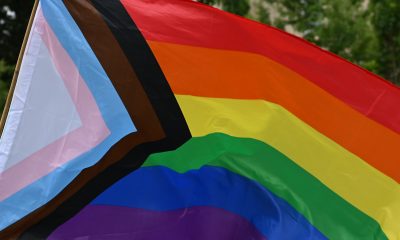News
Activistas nicaragüenses asisten taller de Victory Institute
Protestas contra el gobierno han dejado cientos de muertos
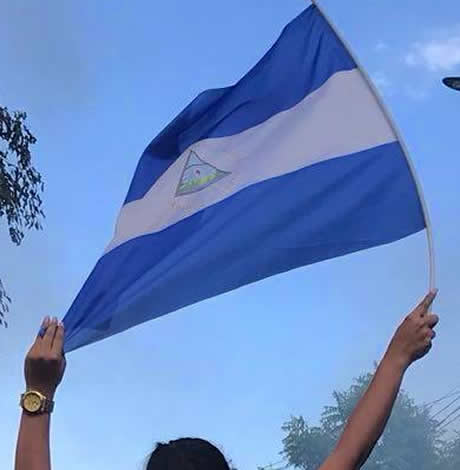
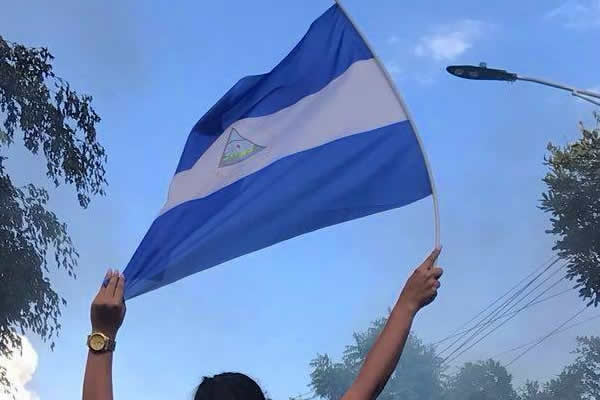
Un grupo de cinco activistas nicaragüenses asistieron a un taller patrocinado por el Victory Institute que se realizó cerca de la capital hondureña de Tegucigalpa el pasado fin de semana. (Foto dominio público)
Los activistas que viene de la capital nicaragüense de Managua y la ciudad de Chinandega están entre las 28 personas que asistieron al taller patrocinado por el Victory Institute que se realizó fuera de la capital hondureña de Tegucigalpa el 28-29 de septiembre.
SOMOS CDC, Asociación Lambda y Caribe Afirmativo — tres grupos LGBTI de Honduras, Guatemala y Colombia respectivamente — también organizaron el taller.
El taller — uno de tres que se espera realizarse en Centroamérica durante los próximos meses — se realizó menos de seis meses después del comienzo de las protestas contra el gobierno del presidente nicaragüense Daniel Ortega y su esposa, la vice presidenta Rosario Murillo. Ira sobre el plan de reducir los beneficios de seguridad social y la respuesta del gobierno a un incendio en la Reserva Biológica Indio Maíz en la costa caribeña del país provocaron las protestas.
Los informes indican más de 500 personas han sido asesinadas desde el comienzo de las protestas el 18 de abril. Los activistas preguntaron al Washington Blade de no identificarles por nombre o de publicar sus fotos por razones de preocupaciones sobre su seguridad.
Un activista, un hombre gay de Chinandega, notó la Mesa Nacional LGBTIQ de Nicaragua era entre las primeras organizaciones que instaron al gobierno de no usar violencia contra las manifestantes. El activista señaló la Mesa Nacional LGBTIQ de Nicaragua el 15 de junio emitió otro comunicado que llamaba al gobierno de participar en un dialogo con líderes de las protestas que la Comisión Interamericana de Derechos Humanos y obispos católicos habían negociado.
El grupo también demandó “el cese a la represión en todos sus niveles y en toda Nicaragua” y “la libertad de todas las personas ilegalmente encarceladas.”
“La Mesa Nacional LGBTIQ de Nicaragua repudia enérgicamente todas las acciones violentas del régimen ortega murillo destacada hacia la población nicaragüense,” dice el comunicado.
Activista: Nicaragüenses LGBTI han sido asesinados
William Ramírez Cerda, un activista gay, y más de 200 otras personas fueron atrapados al dentro de una iglesia a la Universidad Nacional Autónoma de Nicaragua en julio cuando las fuerzas pro gubernamentales la rodeaban. Ramírez dijo al Blade durante una entrevista después del asedio de 15 horas que un estudiante que fue disparado en la cabeza fuera de la iglesia murió.
El activista gay de Chinandega dijo al Blade que personas LGBTI han sido asesinado en su ciudad durante protestas contra el gobierno. Una activista de Managua que se describe como una “mujer lesbiana” y “feminista organizada” dijo que actualmente hay 11 presos políticos LGBTI en Nicaragua.
Los activistas también dijeron que el gobierno ha lanzado una “campaña de desinformación” en las redes sociales para atacar a los activistas LGBTI y otros participantes en las protestas.
Una captura de pantalla que el activista gay de Chinandega mandó al Blade tiene una foto de una “terrorista” buscado descrito como “promotor de odio y violencia a través de sus redes sociales.” Otra captura de pantalla de una página de Facebook que fue grabada el 29 de agosto tiene fotos de activistas descritos como “asesinos terroristas de la derecha.”
“La campaña de desinformación va a dirigir exactamente para las y los activistas LGBT quien han estado de forma visible en la lucha,” dijo el activista gay de Chinandega.
Otros activistas que hablaron al Blade dijeron que han sido amenazados por simpatizantes del gobierno.
Un activista gay de Managua dijo que traía medicamentos y otros suministros a los estudiantes que ocuparon dos universidades. También dijo al Blade que vio miembros de la Policía Nacional de Nicaragua matan a manifestantes.
El activista dijo simpatizantes del gobierno en su barrio “me amenazan mucho.”
“A veces tengo que irme a otro lado de Managua donde visito a familiares,” dijo al Blade.
Una activista trans de Managua dijo al Blade que trata de mantener un bajo perfil porque muchos de sus vecinos apoyan el gobierno. La activista dijo que una compañera trans fue forzada de cortarse el cabello mientras ella estaba bajo custodia.
“Comenzamos pues tener más cuidado de hacer cualquier comentación en Facebook, cualquier publicación,” ella dijo al Blade. “Yo siempre dijo ante de la seguridad de mi es la de mi familia.”
Una activista de Chinandega estaba estudiando a una universidad en Managua cuando empezaron las protestas. Ella dijo la inquietud le provocó de renunciar de su trabajo y volver a Chinandega.
“Esto me afectó directamente,” dijo la activista.
El activista gay de Chinandega dijo al Blade se ha detenido por la Policía Nacional tres veces. Dijo que ahora vive con su hermana “por razones que me han dado a la policía.”
“Yo no estoy viviendo en mi casa,” el dijo al Blade.
Funcionarios nicaragüenses bajo sanciones estadounidenses
Ortega — que lideró el movimiento sandinista que se derrumbó el gobierno del entonces dictador Anastasio Somoza en 1979 — ha sido presidente de Nicaragua desde 2007. No hubo protestas visibles contra el gobierno en Managua cuando el Blade reportaba desde la ciudad al fin de febrero, aunque líderes de la oposición han dicho que Nicaragua se ha convertido en un país más autoritario bajo el régimen Ortega Murillo.
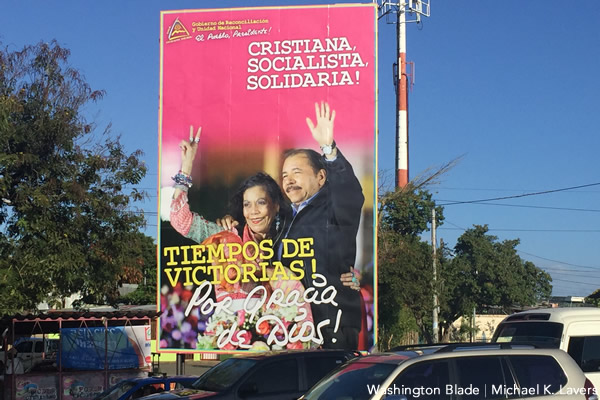
Un cartel en Managua, Nicaragua, el 27 de febrero de 2018, promueve el presidente nicaragüense Daniel Ortega y su esposa, la vicepresidenta Rosario Murillo. Protestas contra el gobierno del país centroamericano han dejado cientos de muertos. (Foto del Washington Blade por Michael K. Lavers)
Los EEUU en Julio sancionó al comisionado de la Policía Nacional Francisco Javier Díaz Madriz y dos otros altos funcionarios del gobierno bajo una ley que congela los activos de ciudadanos extranjeros que cometen abusos contra los derechos humanos y les prohíbe ingresar a los EEUU. Los activistas dijeron al Blade que apoyan más sanciones en contra el gobierno de Ortega Murillo, y no una posible intervención militar de los EEUU y/o otros países para expulsarlo del poder.
“Lo que no estamos de acuerdo desde mi punto de vista es una intervención militar,” dijo el activista gay de Chinandega.
La activista que salió de Managua y volvió a Chinandega después del comienzo de las protestas estaba en acuerdo con sus compañeros que dijeron Ortega y Murillo tienen que renunciar. La activista dijo que los partidarios del gobierno con posiciones en las instituciones del Estado nicaragüense también deben salir.
“Hay impunidad,” la activista dijo al Blade.
Politics
Survey finds support for Biden among LGBTQ adults persists despite misgivings
Data for Progress previewed the results exclusively with the Blade

A new survey by Data for Progress found LGBTQ adults overwhelmingly favor President Joe Biden and Democrats over his 2024 rival former President Donald Trump and Republicans, but responses to other questions may signal potential headwinds for Biden’s reelection campaign.
The organization shared the findings of its poll, which included 873 respondents from across the country including an oversample of transgender adults, exclusively with the Washington Blade on Thursday.
Despite the clear margin of support for the president, with only 22 percent of respondents reporting that they have a very favorable or somewhat favorable opinion of Trump, answers were more mixed when it came to assessments of Biden’s performance over the past four years and his party’s record of protecting queer and trans Americans.
Forty-five percent of respondents said the Biden-Harris administration has performed better than they expected, while 47 percent said the administration’s record has been worse than they anticipated. A greater margin of trans adults in the survey — 52 vs. 37 percent — said their expectations were not met.
Seventy precent of all LGBTQ respondents and 81 percent of those who identify as trans said the Democratic Party should be doing more for queer and trans folks, while just 24 percent of all survey participants and 17 percent of trans participants agreed the party is already doing enough.
With respect to the issues respondents care about the most when deciding between the candidates on their ballots, LGBTQ issues were second only to the economy, eclipsing other considerations like abortion and threats to democracy.
These answers may reflect heightened fear and anxiety among LGBTQ adults as a consequence of the dramatic uptick over the past few years in rhetorical, legislative, and violent bias-motivated attacks against the community, especially targeting queer and trans folks.
The survey found that while LGBTQ adults are highly motivated to vote in November, there are signs of ennui. For example, enthusiasm was substantially lower among those aged 18 to 24 and 25 to 39 compared with adults 40 and older. And a plurality of younger LGBTQ respondents said they believe that neither of the country’s two major political parties care about them.
European Union
Activists demand EU sanction Uganda over Anti-Homosexuality Act
Yoweri Museveni signed law on May 29, 2023
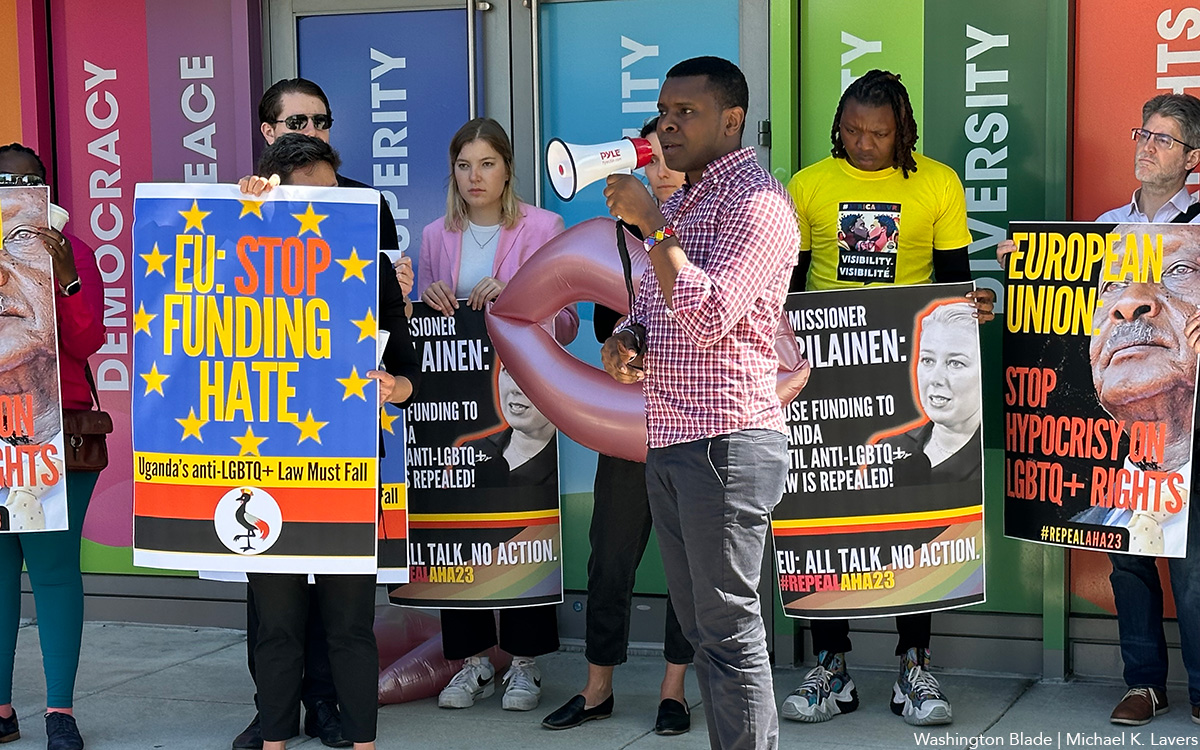
More than a dozen activists who protested in front of the European Union Delegation to the United States in D.C. on Thursday demanded the EU to sanction Uganda over the country’s Anti-Homosexuality Act.
Hillary Innocent Taylor Seguya, a Ugandan LGBTQ activist, and Global Black Gay Men Connect Executive Director Micheal Ighodaro are among those who spoke at the protest. Health GAP Executive Director Asia Russell also participated in the event that her organization organized along with GBGMC and Convening for Equality Uganda, a Ugandan LGBTQ rights group.
Ugandan President Yoweri Museveni last May signed the Anti-Homosexuality Act that, among other things, contains a death penalty provision for “aggravated homosexuality.”
The country’s Constitutional Court on April 3 refused to “nullify the Anti-Homosexuality Act in its totality.” A group of Ugandan LGBTQ activists have appealed the ruling.
A press release that Health GAP issued ahead of Thursday’s protest notes EU Commissioner for International Partnerships Jutta Urpilainen on March 6 announced more than €200 million ($212.87 million) for Uganda in support of “small business owners, young female entrepreneurs, agribusinesses as well as vital digital infrastructure projects in full Team Europe format with the European Investment Bank (EIB) and several member states.”
“These concrete initiatives will make a difference to aspiring entrepreneurs, Ugandan businesses and create jobs in multiple sectors,” said Urpilainen in a press release that announced the funds. “This is a perfect example of how Global Gateway can make a tangible difference for citizens and businesses and unlock the full potential of a partner country by working together.”
Convening for Equality Uganda on Tuesday in a letter they sent to Urpilainen asked the EU to review all funding to Uganda and “pause or reprogram any funds that go via government entities.” The protesters on Thursday also demanded European Commission President Ursula von der Leyen “to hold Ugandan President Museveni’s government accountable for this attack on human rights.”
Josep Borrell, the EU’s top diplomat, in a statement he released after Museveni signed the Anti-Homosexuality Act said the law “is contrary to international human rights law and to Uganda’s obligations under the African Charter on Human and People’s Rights, including commitments on dignity and nondiscrimination, and the prohibition of cruel, inhuman or degrading punishment.”
“The Ugandan government has an obligation to protect all of its citizens and uphold their basic rights,” said Borrell. “Failure to do so will undermine relationships with international partners.”
“The European Union will continue to engage with the Ugandan authorities and civil society to ensure that all individuals, regardless of their sexual orientation and gender identity, are treated equally, with dignity and respect,” he added.
Urpilainen last September in a letter to the European Parliament said the EU would not suspend aid to Uganda over the law.
Politics
Court records raise concerns about right-wing TikTok investor’s influence
Jeff Yass is a Pa. billionaire who has funded anti-LGBTQ causes

The role played by Pennsylvania billionaire Jeff Yass in the creation of TikTok might be far greater than was previously understood, according to new reporting that raises questions about the extent of the right-wing megadonor’s influence over matters at the intersection of social media, federal regulations, and electoral politics.
In 2012, Yass’s firm, Susquehanna International Group, spent $5 million for 15 percent of the short-form video hosting platform’s Chinese-owned parent, ByteDance. In the years since, as TikTok grew from a nascent startup to a tech giant with 1.5 billion active monthly users and an estimated $225 billion valuation, Yass and his firm pocketed tens of billions of dollars.
Beyond the size of Susquehanna’s ownership stake, little was known about its relationship with ByteDance until documents from a lawsuit filed against the firm by its former contractors were accidentally unsealed last month, leading to new reporting by the New York Times on Thursday that shows Susquehanna was hardly a passive investor.
In 2009 the firm used a proprietary, sophisticated search algorithm to build a home-buying site called 99Fang, tapping software engineer and entrepreneur Zhang Yiming to serve as its CEO. The company folded. And then, per the Times’s review of the court records, in 2012 Susquehanna picked Yiming to be the founder of its new startup ByteDance and repurposed the technology from 99Fang for use in the new venture.
Importantly, the documents do not provide insight into Yass’s personal involvement in the formation of ByteDance. And Susquehanna denies that the company’s search algorithm technologies were carried over from the real estate venture — which, if true, would presumably undermine the basis for the lawsuit brought by the firm’s former contractors who are seeking compensation for the tech used by ByteDance.
Questions about Yass’s influence come at a pivotal political moment
In recent weeks, federal lawmakers have moved forward with a proposal that would force ByteDance to divest TikTok or ban the platform’s use in the U.S. altogether, citing the potential threats to U.S. national security interests stemming from the company’s Chinese ownership.
The bill was passed on March 13 with wide bipartisan margins in the House but faced an uncertain future in the Senate. However, on Wednesday, House Speaker Mike Johnson (R-La.) announced plans to fold the proposal into a measure that includes foreign aid to Ukraine, Israel, and Taiwan, likely bolstering its chances of passage by both chambers.
Last month, shortly after meeting with Yass at his home in Mar-a-Lago, former President Donald Trump changed his longtime stance and came out against Congress’s effort to break up or ban TikTok. The timing led to speculation about whether the billionaire businessman was behind Trump’s change of heart, perhaps by contributing to the cash-strapped Republican presidential nominee’s electoral campaign or through other means.
Meanwhile, Yass has emerged as the largest donor of the 2024 election cycle. A coalition of public interest and government watchdog groups have called attention to the vast network of right-wing political causes and candidates supported by the billionaire, often via contributions funneled through dark money PACs that are designed to conceal or obscure the identities of their donors.
The Action Center on Race and the Economy, Make the Road, POWER Metro: Faith in Action, Free the Ballot, and Little Sis launched a website called All Eyes on Yass that features research into the various causes he supports, along with insight into the networks connecting the entities funded by his contributions.
Broadly, in Pennsylvania they fall into five categories: Advocacy against reproductive freedom and LGBTQ rights via the Pennsylvania Family Institute, lobbying on behalf of oil and gas industry interests by the Pennsylvania Manufacturers’ Association, anti-union groups supported by Commonwealth Partners, a privately owned registered investment advisory firm/independent broker-dealer, the Commonwealth Foundation for Public Policy Alternatives, which seeks to privatize public schools and defeat proposed increases to the minimum wage, and the Citizens Alliance of Pennsylvania, which advocates for lowering taxes on corporations and the rich.
Additionally, All Eyes on Yass reports that the billionaire has given massive contributions to Club for Growth and direct spending to support the electoral campaigns of right-wing Republicans including Florida Gov. Ron DeSantis; U.S. Sens. Ted Cruz (Texas), Rand Paul (Ky.), and Josh Hawley (MO); U.S. Rep. Lauren Boebert (Colo.), and former U.S. Rep. Madison Cawthorn (N.C.).
-

 Africa4 days ago
Africa4 days agoCongolese lawmaker introduces anti-homosexuality bill
-

 World4 days ago
World4 days agoOut in the World: LGBTQ news from Europe and Asia
-

 District of Columbia3 days ago
District of Columbia3 days agoReenactment of first gay rights picket at White House set for April 17
-

 Africa3 days ago
Africa3 days agoUgandan activists appeal ruling that upheld Anti-Homosexuality Act





